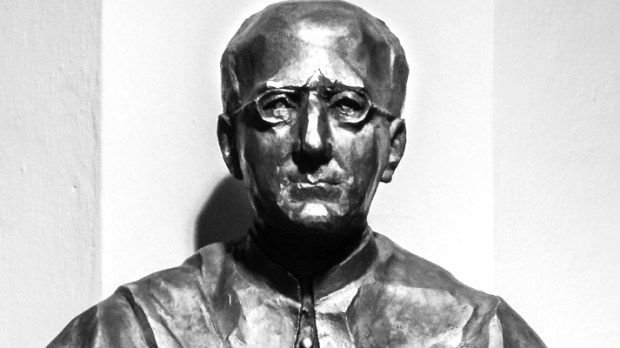Throughout the horrors of the Holocaust, there were always those who stood tall and spoke out against the tyranny. The courage of these people, staring into the face of death, is awe inspiring. Bernhard Lichtenberg was one of these people.
Bernhard was afraid. He felt his fear. It attacked him from head to toe. But it did not matter. He knew in his heart he must do the “right thing.” If he had lived in America he would have been safe, he would not have felt fear. But he lived in Nazi Germany. If you were a Catholic priest and spoke out publicly against Nazi tyranny, your chances at longevity were immediately reduced.
Bernhard Lichtenberg was born in 1875 in Lower Silesia, in Prussia. There were five siblings in the family and he was the second oldest. His father was a merchant and earned a modest living. The family had all that they needed to have a good life.
Bernhard received his Abiturium (basically a high-school diploma qualifying the recipient for university studies) somewhere around 1889. He had been feeling the call to the priesthood and answered that call, beginning theological studies shortly thereafter. Bernhard, an excellent student and a young man filled with an exploding faith, was ordained a priest in 1899.
Father Lichtenberg began his ministry in Berlin in 1900. He became a pastor of Sacred Heart parish in Charlottenberg (in western Germany) and then served as a military chaplain during World War I. The years passed by and the Nazis were slowly but surely obtaining power. Then came 1931.
The famed movie All Quiet on the Western Front had been released. Father Lichtenberg began encouraging his parishioners at St. Hedwig’s Church to go see the film. None other than Josef Goebbels’ paper, Der Agriff, attacked Father with a vengeance for doing so. Father Lichtenberg, active in the Centre Party since 1920, had moved on to also become a member of the Peace Association of German Catholics.
Father Lichtenberg continued to speak out against growing Nazi injustice and on March 31, 1933, only two months after Hitler seized power, Father arranged for a Jewish banker to meet with the archbishop of Breslau, Cardinal Bertram, trying to get him to intervene to stop the anti-Semitic boycott of Jewish businesses.
The Nazis took notice of Lichtenburg’s incessant meddling and he was placed much higher up on their watch-list. When Father Lichtenburg went directly to Hermann Goering to protest the cruelties he was hearing about at the concentration camps, Goering was furious. He denied everything and ordered Father Lichtenberg be taken into “protective custody” for “spreading lies” about the German state.
Father was released from jail after a short stay and immediately went back to protesting Nazi cruelty. In 1937 he began to distribute Pope Pius XI’s condemnation of the Nazis, called Mit Brennender Sorge. From the pulpit Father Lichtenberg told his congregation, in referring to Kristallnacht and the burning of synogogues, “We know what happened yesterday. We do not know what tomorrow holds. However, we have experienced what happened today. Outside, the synagogue burns. That is also a house of God.”
From this point on Father Bernhard was a marked man. He had become an outspoken critic of the Nazis and decried their murdering of the mentally disabled, organizing a public protest in 1941. In October of that year he was arrested.
When the Nazis searched his home they found pamphlets that Father intended to distribute the following Sunday, denouncing Josef Goebbels. While being interrogated he was adamant that he opposed the Nazi treatment of the Jews because it violated Christian charity. He told his captors that Nazism was completely incompatible with the teachings and commands of the Catholic Church.
Talk about guts — Father Lichtenburg had plenty.
Father was held for two years and then shipped off to Dachau, known as the clergy barracks because it housed more than 2,500 Catholic priests. However, Father Lichtenburg never made it to Dachau. He died in a cattle car before the journey was over.
At Father Bernhard’s beatification ceremony in 1996, Pope St. John Paul II said, “Do not fear those who kill the body but cannot kill the soul.”
Blessed Bernhard Lichtenburg spit into the face of fear, stared into the eyes of evil and allowed his courage to win the day.
Blessed Bernhard Lichtenburg, please pray that all of us may have courage when we need it.

